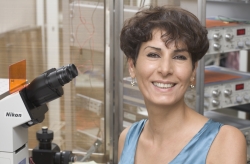
Researchers at University of Florida Health have discovered the mechanics of how dopamine transports into and out of brain cells, a finding that could someday lead to more effective treatment of drug addictions and neurological disorders such as Parkinson’s disease.
The researchers, including Habibeh Khoshbouei, Pharm D., Ph.D., an associate professor of neuroscience in the UF College of Medicine, report their findings in the current edition of the journal Nature Communications, published today (Jan. 25).
The findings are significant because dopamine is involved in many brain-related functions, Khoshbouei said. Too little dopamine can lead to Parkinson’s disease, a brain disorder that causes shaking and problems with movement and coordination. Abnormally high concentrations of dopamine are linked to schizophrenia and other psychiatric disorders. Cocaine and methamphetamine affect the brain by blocking the normal transport of dopamine back into neurons.

